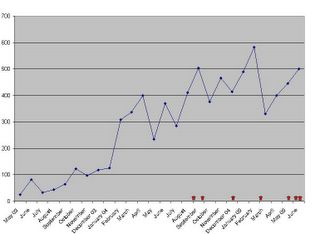For Whom Is Worse Better?: More on French Media and Iraqi Violence
As with some of the immediate reactions of Le Monde to the 9/11 attacks that I recently re-visited in “French School Exam: 9/11 as Protest”, this precipitate abandonment of facts for questionable interpretations of them – the possible relevance of which could, in any case, only be assessed in the far longer run – presumably reflects a sort of wish fulfillment. In fact, ever since the beginning of the US-led intervention in Iraq, the alleged threat of a civil war among Iraq’s “ethnic and religious communities” has been brandished by French commentators as a reason for opposing the toppling of Saddam Hussein – whose brutal regime was thereby tacitly, and sometimes not so tacitly, given approving recognition as the guarantor of Iraqi unity and public order. (In his La guerre à outrance, subtitled “How the Press Has Misinformed Us about Iraq”, the journalist Alain Hertoghe provides a detailed day-by-day account of the doomsday scenarios that passed for reporting in the French press during the three weeks of hostilities between the regular Iraqi Army and Coalition troops - for his trouble, as reported here, he was fired from his own employer, the Catholic paper La Croix.) Nearly two years later, in January 2005, when Iraq held free elections for its transitional National Assembly, the trope had lost none of its appeal for the French media. On the very night of the elections, the publicly-financed French-German channel Arte conducted an interview with a Middle East “specialist” from France’s National Center for Scientific Research (CNRS) who, in effect – and this is a measure of just how twisted French reporting on Iraq has been – “reassuringly” opined that even this event was a bad thing, since democracy in Iraq would only entail civil war.
It would seem that the priority for France’s two most influential papers nowadays is not to report developments in Iraq, but rather to exploit them in order to prove that, all along – i.e. despite occasional “setbacks” like the Iraqi elections – they were “right” about the Iraq "quagmire". But whereas the papers and indeed the French government – whose obstructionist Iraq policy the papers have, in effect, dutifully served – pretend merely to be following events in Iraq with sincere concern, the fact is that both – not only the French government, but even the French press – have been active players in the Iraqi drama. Look again at the chart relating ransom payments to spikes in Iraqi terror that I published at the end of June (see "Ransom and Terror in Iraq").

(click on image for larger version)
Note the three arrows, representing presumptive ransom payments in May and June, bunched together toward the right-hand extreme of the chart. It was entirely predictable, after this massive infusion of financial resources for the groups perpetrating the attacks, that July would be a particularly bloody month in Iraq. Regrettably, we can expect more of the same in August. And remember that one of those arrows represents a reported $15 million ransom payment by the French government to obtain the release of Libération reporter Florence Aubenas.


<< Home